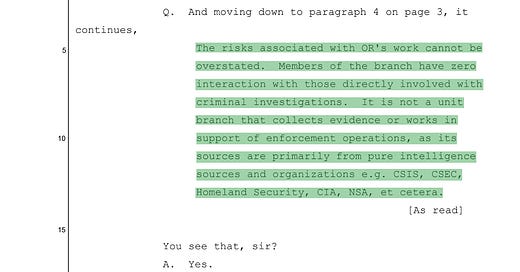Unit run by alleged RCMP mole had access to CIA and NSA intel: Ottawa trial
Ortis lawyers suggest in cross-examination that he could have disrupted Iran's money laundering operations in Toronto
The trial of former RCMP intelligence director Cameron Ortis has heard Operations Research — the secretive “pure intelligence” unit he allegedly compromised — faced extreme risks because of its handling of sensitive information from agencies including the CIA and NSA.
Dan Morris, who worked under Ortis at Operations Research in 2014 and 2015, told a jury the unit had clear guidelines against contacting the targets of criminal investigations, because that could risk exposing sensitive intelligence to court procedures.
Ortis is accused of contacting criminal targets in the network of Altaf Khanani, one of the world’s biggest money launderers and Hezbollah terrorist financiers, and seeking to profit by selling RCMP investigative and operational plans.
While Ortis faces a number of charges for breaching Canada’s security of information laws, his case likely has international ramifications, including harming Canada’s ability to work with its allies, according to former U.S. officials involved in the Hezbollah probes that Ortis allegedly compromised.
One of the officials, David Asher, told The Bureau that in the worst case scenarios, Ortis and Operations Research could have compromised highly sensitive information dealing with states such as China, gleaned from CIA or NSA reporting.
The trial has heard that evidence including classified files seized from Ortis’ electronic devices in 2019 has only been partially decrypted by RCMP forensic investigators.
On Monday, in Ontario Superior Court hearings blocked to media due to a publication ban, the jury heard that Operations Research was started in 2010, with no mandate to gather evidence for criminal investigations.
(On Tuesday, Canadian justice officials released an approved transcript of Monday’s court proceedings to The Bureau.)
Instead, the unit was to be the RCMP’s eyes on the world and emerging threats in Canada, purposed to provide senior RCMP leaders with sensitive intelligence that would enable the national force to work more effectively with CSIS and Canada’s international intelligence partners.
Crown cited the Operations Research [OR] mandate documents, which say:
“The risks associated with OR's work cannot be overstated. Members of the branch have zero interaction with those directly involved with criminal investigations. It is not a unit branch that collects evidence or works in support of enforcement operations, as its sources are primarily from pure intelligence sources and organizations e.g. CSIS, [CSE] Homeland Security, CIA, NSA, et cetera.”
And the Crown asked Morris to explain what the damage could be if the unit breached its guidelines, which is what the Crown alleges occurred, under Ortis.
“All of OR’s work was built on the trust that our intelligence partners had in us, otherwise the intelligence would stop,” Morris said. “We would stop receiving intelligence information from our security intelligence partners. So, they needed to be confident that we had processes and mechanisms in place to protect that material and make sure that it didn’t seep into a criminal investigation and potentially get exposed or compromised.”
The jury also heard Monday, that Operations Research focused almost exclusively on counter-terrorism intelligence until 2012, when it started to gather intelligence that CSIS was developing on national security and espionage threats related to transnational organized crime in Canada.
The Crown continued to question Morris about Operations Research’s interest in transnational organized crime, and the collection and reporting of “covert intelligence” related to criminal suspects, to senior RCMP leaders.
“Is action for Operations Research, mean going out and investigating those targets in investigation?”
“No, it doesn’t,” Morris answered.
Ortis lawyers suggest Iranian money laundering disruption op
In cross-examination Tuesday, Ortis’ lawyer Mark Ertel pressed Morris to provide information on Operations Research’s interest in large-scale money laundering investigations in Toronto, and whether Morris understood that criminal groups in Canada could be financing Hezbollah and Hamas on behalf of Iran, and contributing to the current bombing of Israel.
The jury heard Ortis’ lawyers imply — without explicitly stating — that Ortis could have been running an undercover investigation or disruption operation, that authorized him to contact targets in a Five Eyes investigation of Altaf Khanani and Hezbollah terror financing.
“It was certainly information available to Operations Research that Iran may have a connection to money laundering that was taking place in Toronto,” Ertel said to Morris. “If it turned out that money was being laundered in Toronto and it was winding up in the hands of the Revolutionary Guard [of Iran]. That would be a significant problem and threat, right?”
“Yes, it would,” Morris answered.






